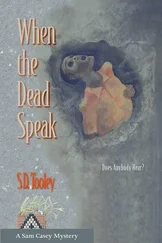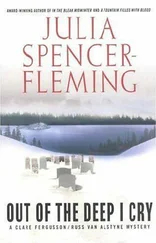Bill Talbot also reckoned that Richard Marshall was completely unbreakable. Karen hoped that he wasn’t right. She tried to make herself believe, really believe, that she was the one who could make him talk. She was so aware, in spite of the new evidence, how much still rested on this interview.
“We’ll start when I say. And we’ll stop when I say,” she told Marshall sharply. “You are no longer in control of anything, Mr. Marshall, so let’s get that straight from the start, shall we?”
“Maxwell.”
“No. You have been arrested as Richard Marshall. That was your name when you committed the crime we have arrested you for, it is still your legal name and it is the name you will be charged under. I’ve just told you, you no longer call the shots, and you may as well get used to it.”
Marshall shrugged, held out both hands palms upwards.
“What’s in a name, anyway?” he enquired.
There again was that laconic note in his voice that she had first noticed in Poole. His lips curled in a mocking smile. She had an almost overwhelming urge to slap his face and wipe the smirk off it.
“Right,” she said, briskly motioning to PC Brownlow to switch on the double tape recorder — an extremely neat state-of-the-art digital affair now, very different from the big clumsy machines which had been in operation when Marshall had last been arrested.
“Interview with Richard Marshall, present DC Tompkins, PC Brownlow and Detective Superintendent Karen Meadows.” She glanced down at her watch. “Interview begins 5.15 P. M.”
Then she looked up at Marshall, squared her shoulders, and dived straight in, going for the shock approach.
“You should know that the remains of a body almost certainly identifiable as your wife Clara have been found,” she announced.
If Marshall was shocked he gave no sign of it at all. Instead he leaned further back in his chair and the smile widened.
“Really?” he remarked almost lazily. “I saw something in the paper, actually. Pure speculation. You don’t believe what you read in the papers if you’ve got any sense, do you?”
He looked and sounded extraordinarily sure of himself. But then, Karen reminded herself, if Marshall had killed his little family, as she was so sure that he had, then he would know full well where he had dumped their bodies, and he would be as certain as anyone could be that no body was likely to be found after all that time in the depths of the Atlantic Ocean.
He was, however, wrong about that, which was Karen’s trump card. Freak circumstances had preserved at least one of those bodies, trapped it and kept it to some extent intact. Freak circumstances had also thrown up from the ocean bed that Rolex watch which could be traced beyond any reasonable doubt to Clara Marshall. Freak circumstances had at last presented the Devon and Cornwall Constabulary with that stroke of luck John Kelly had said was their due at last.
It was going to give her a lot of pleasure to relate all this to Marshall. Sometimes you held back from telling your suspect much about your case against them. Karen believed this was a situation in which it was right to tell him everything. Indeed she felt it was her only hope of breaking him, if there was even the remotest prospect of that, she thought, as she stared into his mocking eyes.
“On this occasion the newspaper reports have been spot-on,” said Karen.
Marshall’s eyes narrowed. You could almost see his thought processes. “You’ve been able to positively identify a body that would therefore have been in the ocean for twenty-eight years,” he responded eventually, his voice casual but his words chosen with infinite care.
“Yes, we have, as a matter of fact,” Karen responded equally casually, making a big effort to remain calm.
Marshall flinched, she was sure he flinched. It was almost imperceptible, though. For a fleeting moment she thought she saw fear in those pale blue eyes, then it was gone. This man gave so little away.
She explained it all then, briefly but succinctly. And when she told him about the watch, the watch that was almost definitely Clara’s and which had been found by her body, she noticed that he turned his face away, perhaps so that she could no longer see his eyes. She paused several times to let him speak if he wished, wondering if he could be tempted into some indiscretion. He wasn’t, of course. He remained, outwardly at least, as cool as ever.
When she had finished he still did not speak until she actually asked him what he had to say. Marshall shrugged his big shoulders then, and turned to her again, the mockery back in his eyes — if, indeed, it had ever left. He really was a smug bastard.
“So?” he enquired. “Even if it’s Clara’s watch it doesn’t necessarily mean you’ve found her body. And if it is her body, well, I still have no idea how it got there. I didn’t put it there. I never touched any of my family. I wouldn’t ever have done such a thing. Not ever.”
“Mr. Marshall, you were seen taking your boat out of Torquay Harbour at night, right after Clara and your girls were seen for the last time. We have witnesses to that. Now your wife’s body has been found at sea, and I promise you absolutely that it is her and that our identification of her will almost certainly already stand up in any court in the land, and that we are confidently expecting further confirmation. I therefore put it to you also that any jury would accept the quite reasonable deduction that you killed Clara and the girls and that you dumped all three of their bodies at sea.”
“No. I didn’t.” Marshall didn’t bat an eyelid. His voice remained steady. “You’ll never shake me, you know. I didn’t do it.”
Karen could feel the frustration already building up in her. He was an infuriating man. No wonder the case had bugged Bill Talbot so much, she thought.
“So it was all just a coincidence, was it?” she enquired, matching his earlier sarcasm with her own.
“Yes, it was,” he replied easily. “Just a coincidence.”
Karen leaned forward across the table.
“I don’t believe in those sorts of coincidences, Mr. Marshall,” she said. “And neither will a court of law.”
Karen interviewed Marshall solidly for almost two hours. At the end she reckoned she was probably considerably more exhausted than he was. Her prime suspect appeared to have remained singularly unmoved by all that was happening around him. He did not budge an inch. The passage of time had not changed him, it seemed. Although initially shaken by his arrest, he had settled back into what she had been told had always been his approach to any investigation into the disappearance of his family.
Marshall continued to waver between a kind of arrogant contempt and a laconic sarcasm. His confidence never seemed to falter. He even waived his rights to a solicitor throughout.
“I am innocent, why would I need a lawyer?” he enquired.
Karen decided that the only hope was to keep up the pressure in an attempt to wear Marshall down. She might be wearied by her verbal contest with him, but one advantage she did have over the man was that she was not alone. She could step down and ask others to take over. She decided on a policy of continuing to interview Marshall, with the minimum number of breaks allowed, for as long as the law permitted, using various members of her team in succession.
Then somewhere around 10 P. M., after munching a couple of chocolate bars to replenish her flagging energy, she resolved to have another go herself.
To her immense irritation Marshall’s face positively lit up when she entered the interview room, breaking into a sardonic grin which stretched from ear to ear.
“Ah, Detective Superintendent,” he began, addressing her before she could him and thus yet again giving every appearance of being in charge, something he was extremely good at, Karen reflected.
Читать дальше












